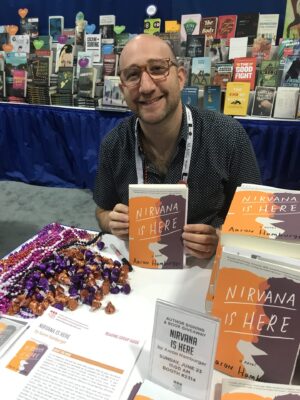 Aaron loves to join book club discussions!
Aaron loves to join book club discussions!
If your book club is reading one of his books, he’d be thrilled to answer questions via Zoom or Skype.
Please fill out the form below to inquire or arrange.
Find a complete Reading Group Guide Here!
- Consider the title Hotel Cuba. What does it mean to you? To what extent is Pearl’s stay in Cuba a temporary stop in her life’s journey and to what extent has it left its mark on her character and the direction of her life?
- Think about the sacrifices Pearl and her sister Frieda must make in leaving their home and adapting to a new way of life. Would you be able to make similar sacrifices in your own life? What are the costs of those sacrifices for the two sisters?
- Pearl is an artist with needle and thread. How do the clothes she works on and wears relate to what’s happening in her life and her mind throughout the novel? What do you think will happen to her career at the end of the book?
- Compare Pearl’s various attractions and love interests in the novel. Do you think she ultimately made the right choice in terms of romance?
- Frieda makes several key life choices in the novel. Pearl has strong opinions about her sister and the direction of her life. Do you think Frieda has made the right choices for herself in the end? How do you think her marriage will turn out?
- How has Pearl’s time in Key West affected her? What does she take away from the Singer family? And what did you make of the mysterious Rabbi Singer?
- What do you know about the history of the Jewish community of Cuba? Do a quick search online to find out more. What do you imagine might have happened to Pearl if she’d decided to stay in Havana rather than immigrate to the U.S.?
- Compare Pearl’s story to other immigrant stories you’ve read as well as contemporary debates about immigration. How do we balance competing concerns regarding immigration in a fair and just way?
- This book was inspired by the true story of Aaron Hamburger’s grandmother. In writing it, the author consulted recorded interviews with his grandparents and did extensive research to fill in missing details he was wondering about. He also says that he wanted to uncover more than just biographical facts. “I wanted to breathe life into my grandmother’s experience, to find out what she ate, how she felt, what her impressions were of life in such a unique place.” What stories do you know about your own family history? Has it been preserved in any way? What do you imagine might have gotten lost in those stories that could be brought back to life through research or imagination?
- In the book’s opening, we meet Ari as a man approaching middle age who’s haunted by his past. What details of his life suggested that Ari is a man who hasn’t let go of his youth? Given that, why do you think he’s so reluctant to reach out to Justin? What do you think he’s hoping for by reconnecting with him?
- What’s the role of social media and technology in the novel? How does it connect to the themes of human connection? How do you deal with social media in your life? Is it something you find harmful, helpful, or a bit of both?
- As readers, we get to know Ari’s story slowly, piece by piece, putting it together like clues in a mystery. Why do you think the author laid out his story this way? What effect did it have on you as a reader?
- Ari’s voice as an adult is in the third person present tense, while his voice in the past is in first person past tense. How did you experience the shift in the voices, and how did these differences help create different impressions of the same character at different stages of his life?
- The novel takes on themes of sexual abuse in both the past and present narratives. In the past narrative, Ari’s abuser Mark, ultimately asks for forgiveness. How did you feel about his request? Can we be forgiven for things we’ve done wrong in our youth? In the present narrative, Ari’s husband M is accused of sexual misconduct. If you had to judge his behavior, where would you come down on it? Where should we draw the line on sexual misconduct today, especially given the #metoo movement?
- How do you interpret the book’s title, which refers to both the band Nirvana, and the spiritual state known as “nirvana”?
- If this book were written from Justin’s point of view, how might it be different? Were you surprised by how his life turned out after high school?
- Why do you think Ari’s parents reacted so differently when he came out to them?
- Ari is inspired by the band Nirvana and its lead singer Kurt Cobain to overcome the trauma he experienced. Were you ever a passionate fan of a singer or a band? What effect did they have on your life?
- Have you ever reconnected with a significant person from your past after a lapse of time? How did it go? What surprised you, disappointed you, or encouraged you about these encounters?
- What do you think Ari’s future will look like after the events of this book?